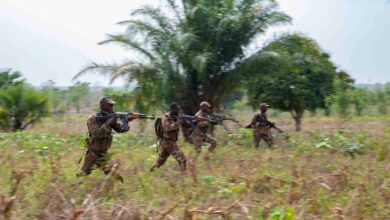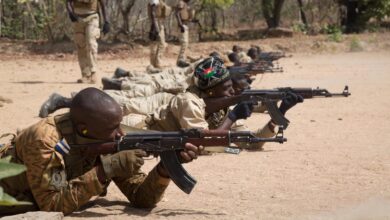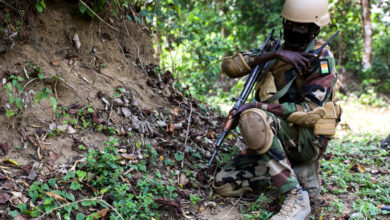Mozambican security forces were Thursday engaged in a “tense” battle with Islamist militants to regain control of a key port in a gas-rich northern province, Defence Minister Jaime Neto said.
Neto was speaking a day after the insurgents staged an early morning attack and captured the port town of Mocimboa da Praia.
“At this moment, the defense and security forces are trying to control the situation,” Neto told reporters in the capital Maputo. “However, it remains tense and fluid.”
Neto said the militants had infiltrated various neighborhoods in civilian clothes, before unleashing terror, looting, and killing government troops and civilians.
The assault was the latest in a string of intensifying attacks that have plagued the country’s northern region since 2017.
Authorities at Mozambique‘s defense forces (FDS) confirmed that “terrorists” had launched “sequenced attacks” on several villages surrounding the port over the past week in an attempt to occupy the town.
Striking Mocimboa da Praia for the third time this year, the brazen attack was orchestrated a stone’s throw from the heart of the site of natural gas projects worth billions of dollars.
Mocimboa da Praia lies less than 80 kilometers (50 miles) south of the Afungi peninsula where a liquefied natural gas (LNG) facility, one of Africa’s biggest single investment projects, is located.
The port in the Cabo Delgado province is a major traffic hub for the gas project.
2/n The map shows the entire area in that part of the world; the red marker is set at Mocimboa da Praia, #Mozambique. The port town itself has around 30,000 inhabitants, and is important to liquefied natural gas exports. Note the proximity to Tanzania.https://t.co/cIriVp7Tpx pic.twitter.com/V3uQa81uc0
— Tim Skellett (@Gurdur) August 13, 2020
Calton Cadeado, a researcher at the Maputo-based Center for Strategic and International Studies, said Mozambique needed the help of neighboring countries to fight the threat.
“I understand that Mozambique is hesitant to ask for support from countries like the United States, France, or the United Kingdom due to the high bill it may have to pay,” he said. “But it should ask for help from … countries in the region, such as Tanzania, which has not yet happened.”
“At the moment, the terrorists do not control any area of the national territories,” the defense minister said, adding that he would not allow Cabo Delgado to descend into a state of “disorder, chaos, and violation of the most basic human rights.”
The attacks in Cabo Delgado have displaced more than 250,000 people and caused more than 1500 deaths, according to the ACLED Data Project.
The attacks started in 2017 in Mocimboa da Praia and have since spread to massive swathes of Cabo Delgado.
The latest attack — the third on the town this year — was claimed by the Islamic State Central Africa Province (ISCAP).
The IS-affiliated group has the stated goal of establishing a caliphate in the region.












